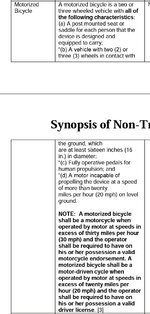Asher, thank you for the response but your post does not refer to any actual D.C. regulations or statutes that are current law.
While the local D.C. politicians may be "
proposing, studying, or introducing legislation", the current D.C. Government code has been simplified and does not classify E-bikes except by "unassisted operating speed". If you operate an e-bike at unassisted speeds in a range of 21-30 mph, it is classified as a "
motor driven cycle" and as such it must be registered and is not permitted on the side walk or the bike lanes. If it is operated at speeds in excess of 30 mph it is classified as a "
motorcycle" and must be registered and cannot be driven in the bike lanes or side walks.
No kind of bike may be driven on the side walk in the designated Business District of Washington D.C. (see pdf)
Here is the link to the D.C. DMV Government page on Non-Traditional Motor Vehicles and DC Law. They provide a six page pdf explaining the differences, restrictions, and DC code citations.
If you enter the federal lands in DC, such as the National Mall, or various monument grounds, you cannot operate an E-bike with 750 or more watts, nor with throttle-only capabilities in excess of 20 mph.
Asher, I may be wrong on this, but I've scoured the D.C. code and cannot find any references to "Class III" E-bikes.
Legal requirements to register and operate a motor vehicle, safety requirements and a distinction between motorcycles and motorized bicycles. Related Content: Vehicle Registrations

dmv.dc.gov

